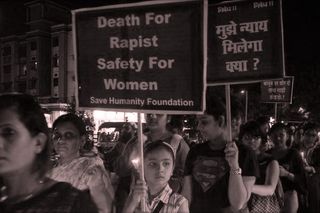
Parliament Enacts Death Sentence for Rape of Girls Under Twelve
A bad idea that purports to combat rape culture just became a law that furthers it.

Yesterday, the Rajya Sabha passed the Criminal Law (Amendment) Bill, which is notable for its mandate of a death sentence for the rape of a girl younger than 12 years. The bill, approved by the Lok Sabha last week, will update provisions of Indian Penal Code, the Code of Criminal Procedure, Evidence Act and Protection of Children from Sexual Offences (POCSO) Act, reports LiveLaw.
In a willy-nilly effort to appear to care about the gang rape of a child in Kathua, the government has passed this bill and, in doing so, taken a sad step back in protecting the youngest and most vulnerable members of society.
First, as we’ve noted before, 88% of criminologists believe that the death penalty has little preventative effect. Therefore, the penalty offers little in terms of actual protection of children, merely punishment for their abusers — which is not unimportant, but worth distinguishing when such a bill is hailed as making children safer.
Second, despite calls for gender-neutral wording, the language of the enacted bill only applies to the rape of girls and women — a sad failing of India’s many male survivors of sexual assault; a 2007 survey by the Ministry for Women and Child Development found more than half of the 12,000-some children interviewed had experienced some form of sexual assault; of those, more than half were boys.
Third, the enactment of the death penalty for the rape of girls under 12 arguably puts children in greater danger. Sexual abusers of children are typically known to the family — a family member, family friend, neighbor, teacher or other known figure in a position of authority and intimacy with the child. (It is worth noting here that the kind of violence this measure was passed in response to was motivated chiefly by a mix of communal hatred and misogyny, rather than pedophilia, but that the latter is the bigger threat to the vast number of children subjected to sexual abuse.) With the death penalty as the minimum mandatory sentence, families already prone to not report these crimes will have additional incentive and/or pressure not to, when the life of a family member or friend hangs in the balance. This conceivably leaves rapists free to prey on more children.
This amendment does not protect women and girls. It very clearly does not protect anyone. In passing this bill, the government has sated understandably emotional responses to horrific crimes, but it has also also furthered the kind of rape culture that allows violence against women to thrive, a rape culture that applies greater value to women’s and girls’ sexual sanctity, and therefore metes out greater punishment to their violators — rather than devote legal effort to measures that would actually make children of both genders safer.
Related


World’s First Domestic Violence Leave Law Enacted in New Zealand
